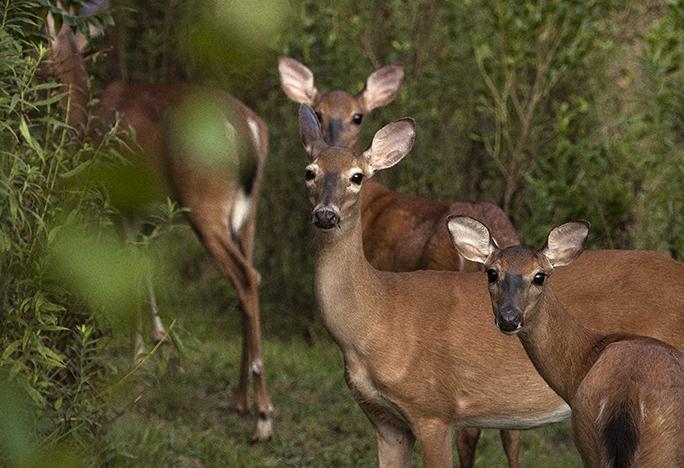Welcome!

The city has passed one vote for an Urban Archery Deer Hunting Program. A second could occur at the March 7 meeting. Eric Abernathy/Randolph Hub
Oh, deer ... and cats, too
Janet Imrick
Randolph Hub
ASHEBORO – Cats and deer have caused enough concern to reach the Asheboro City Council.
In the case of deer, it could lead to a second hunting season with bows and arrows.
On Feb. 8, council members passed the first vote for an Urban Archery Deer Hunting Program after reviewing a drafted policy manual from City Attorney Jeff Sugg. It will require a second vote at their March 7 meeting to be adopted.
Archery for Deer Hunting
The North Carolina Wildlife Resources Commission sets the Urban Archery season in January and February each year. Sugg said it is popular with hunters who fail to reach their quota during the fall hunting season.
If the city adopts the manual with no changes, hunters will need an urban deer hunt permit from the city of Asheboro along with their hunting license from the NC Wildlife Resources Commission. They will be allowed to hunt on their own land within city limits or on another person's property with written permission.
The drafted safety measures include:
• A hunting area must be a minimum of three acres. It can be comprised of adjacent properties whose owners agree to allow hunting.
• Hunting is limited to 30 minutes before sunrise until 30 minutes after sundown.
• Arrows must be fired from an elevated platform at least 10 feet above ground level and toward the interior of the hunting area.
• Arrows cannot be fired from or propelled to within 150 feet of any building or public right-of-way, nor within 300 feet of the property line for a daycare, educational center, church, city park or other location where children are likely to be.
If a wounded deer leaves the permitted hunting area or cannot be recovered, the hunter must notify police. The hunter cannot track the deer onto another property without that property owner's permission.
The city council voted not to allow crossbows. Sugg said other municipalities with urban archery programs ban crossbows because of the safety concerns surrounding their greater velocity.
To get a hunting permit, the applicant will have to pass the NC Wildlife Resources Commission's hunting and safety course and an archery skills proficiency test with the Asheboro Police Department.
The city council first talked about an archery program at their March 2023 meeting, when Police Captain Byron Hill and Wildlife Enforcement Officer Darrell Johnson shared complaints about invasive deer around Dave's Mountain.
Community cat control
During the February meeting, Dr. Tina Byrd with Randolph Animal Hospital spoke on controlling cat populations. She specified the differences between pet cats, wild cats and community cats.
Community cats don't have an owner but adapt to having a caretaker feed them and provide shelter. They are often former pets turned out after their owner died or stopped caring for them. She said community cats can form colonies.
"Feeding bans, which some communities have tried, are ineffective," Byrd said, saying that people are likely to ignore a ban out of concern for the animals.
To control their population, Byrd recommended caretakers practice "Trap-Neuter-Return" (TNR). They can call animal control to round up the cats to be neutered. They will be marked on the ear to keep track of which ones are neutered. Animal control would then return them to the property, where the caretaker is obliged to continue sheltering them while monitoring for new cats.
Byrd said neutering can also curb nuisance behaviors such as fighting or urinating. Common complaints they hear from neighbors are that the cats create messes and noise, have kittens, prey on wildlife, or fall prey to predators.
Byrd said educating people about humane deterrent options is the best method, saying relocating them is ineffective and sending them to the shelter will likely result in them being euthanized.
"It is the best option we have at present,” she said. “If all community cats are rounded up and taken to the shelter, it is a massive operation doomed to failure."
The Randolph Animal Hospital has a list of recommended deterrents from the nonprofit group Best Friends Animal Society.
Council member Clark Bell questioned whether it's fair for a neighbor to spend money on measures because of a community cat. He said, "Why should I have to prevent somebody else's cat from coming on my property at my expense?"
Mayor David Smith asked Byrd to recommend changes to the city's animal nuisance ordinance on the obligations of community cat caretakers.
